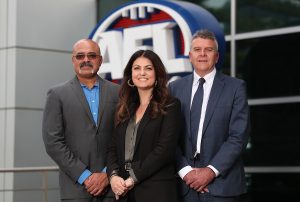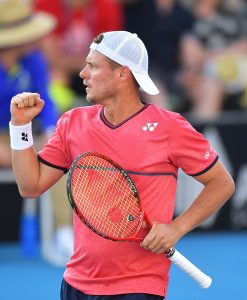David Jones; Mark Brake/AFL Photos
Australians might like to claim they're ahead of the game when it comes to their sporting prowess, but the focus Aussie codes give to the mental health of its athletes leaves plenty to be desired.
When it comes to mental health and Australia’s sporting elite, the word is out: more needs to be done to support those who compete all in the name of glory. The pressure to be the best, handle media scrutiny and navigate injury blowouts is adding to the mental load our athletes face on a daily basis – and finally our governing bodies are doing something about it. But is it enough?
From outspoken AFL stars that have either quit or come close because of mental health pressures [including Collingwood stars Dayne Beams and Adam Treloar, Western Bulldog Lin Jong and recently retired former teammate Tom Boyd in May last year] to pro-tennis players who navigate their competing journey alone, the need to speak-up has never been greater; unfortunately for some, it means ending a sporting dream.

Dr Ranjit Menon, AFL Chief Psychiatrist, Dr Kate Hall, AFL Head of Mental Health and Wellbeing and Lifeline Australia Chief Executive Officer Colin Seery. Photo by Michael Willson/AFL Photos.
Last year, the AFL appointed clinical psychologist Dr Kate Hall and psychiatrist Dr Rangit Menon to help tackle the mental health crisis affecting the code.
“We’ve been appointed on the back of an emphatic statement from the whole industry,” says Hall.
“Elite sport and AFL is a mirror to society, and so the importance of mental health for our sporting clubs, players, coaching staff and umpires really mirrors the importance of mental health more broadly in our community.”
The groundswell for change at the AFL means their three-year plan is crucial if they want to prove themselves as an industry leader, ensuring excellent care for their players and networks.
“We want to reduce those risks and put in protective measures to boost resilience.”
“We know players have a short career span, the media scrutiny is an acute area of stress and discomfort too,” Hall adds. “We want to reduce those risks and put in protective measures to boost resilience.”
Whether it means more players will speak up remains to be seen, but the demand for intervention is there – and the macho walls are finally crumbling. The service also includes AFLW players.

Former AFL footballer Adam Goodes. Photo courtesy of David Jones.
Retired AFL Sydney Swans legend Adam Goodes knows only too well the importance of resilience when playing sport, but that doesn’t mean he didn’t feel the effects of mental health strains in the later part of his career. It’s been over four years since he stopped playing, and two outstanding documentaries in 2019 highlighted the saga that chased him to the bitter end – from the relentless booing and racism that took its toll.
“Those last two years of playing AFL were hard for me to deal with,” explains Goodes.
“Once I got home after those tough games, I was able to switch off and be present with my partner, but I knew every week when I was playing for those two hours that I would get booed half way through,” he says.
“In the final year of experiencing that, I knew it would be my last season so there was an end point – that’s really how I got through it, I knew the end was coming,” Goodes says.
His triumph is proof that there’s plenty of resilience within, but that doesn’t mean he suffered less for his art.
“I didn’t have time to struggle, I needed to talk about what was happening with my football. Those resources helped me get through some pretty disgusting parts of my career but also some parts I learned a lot about myself,” he says.
The 40-year-old says resilience should be taught.
“Depression comes in many forms, and I knew those people in my family who suffered weren’t good talkers and I didn’t want to be like that… If there was a week I was struggling to get out of bed or put my boots on to train, I just had to talk to someone. Once I spoke to someone I felt so much better. I made it part of my routine,” says Goodes, referring to club psychologists who helped.

Adelaide Crows co-captain Chelsea Randall. Photo by Mark Brake/AFL Photos
For AFL Women’s star player Chelsea Randall – co-captain of the Adelaide Crows, trying to stay on the front foot of her mental health strategy is a daily commitment.
“AFLW has gone from amateur players to ones thrust in the limelight; it’s like a YouTube channel that’s gone viral overnight,” says Randall.
“That definitely impacts your mental health; because suddenly everyone is talking about sport in a new light – discussing what a girl can and can’t do.”
Randall recalls her first game against Greater Western Sydney.
“I remember all the talk leading into round one – that really got to me,” she says.
“’Will it be worth watching?’ ‘Why are women playing this sport?’ I was worried about the future of female footy and if people didn’t like us, what would happen?
“I learned how to let go of what you can’t control and reset my mind.”
Hamish McMaster, a consultant psychologist with more than 20 years experience with Tennis Australia, AFL and professional swimmers, says there’s been an increase in the number of athletes seeking his services.
“The demand has increased over the last four years,” says McMaster.
“I think pro-athletes have become good at adding their voice to the mental health space and raising awareness about it, and codes are looking at the complete player and what makes a successful one. It’s about being proactive in mental health support, not just waiting until someone needs it,” he adds.

Former AFL footballer Tom Derickx. Photo courtesy of David Jones.
Former AFL star Tom Derickx has found life after footy as a fashion model with David Jones and with his own rock band, but admits quitting a game he loved had to happen.
“I was always exhausted, had lost my X-factor and my coach noticed it too,” says Derickx.
“I suffered from depression and anxiety throughout my playing career – mostly due to injuries and external pressures of friends and family asking me when was I going to start playing again. I had moved from my home in WA to Melbourne [to play with Richmond] and thought my depression started because of that relocation. It was really horrible.
“Sport still needs to change a lot,” Derickx – who went on to play with the Sydney Swans and retired in 2016 – continues. “Some clubs and athletes still hold onto an old school mentality – it still lingers with some coaches and athletes and they think it’ll pass.”
Around 18 months ago, the Australian Institute of Sport set up a new Federal Government body to assist elite athletes competing in the Olympics, para-Olympics and Commonwealth Games. It is designed to give mental health support to those in need.
According to the Director of Athlete Wellbeing and Engagement Matti Clements, elite athletes in Australia spend most of the year on the road away from family and friends – which has a huge impact on their mental health.
“Some clubs and athletes still hold onto an old school mentality – it still lingers with some coaches and athletes and they think it’ll pass.”
Her department is dedicated to assisting those in need and $802k from the Federal budget has been allocated to the MHRN [Mental Health Research Network] this financial year alone.
Since March 2019, more than 250 referrals have been sought by athletes – with around 2,000 able to use the service.
The AIS contracts 38 professional practitioners (that’s 33 psychologists, three psychiatrists, and two neuropsychologists) and will add 45 practitioners in the next month, including disordered eating specialists.
Whether it’s former Olympic champions like swimmer Ian Thorpe who has detailed his own battles with mental health to former US tennis champions like Andre Agassi who shared it all via a best-selling autobiography, being a perfectionist and existing at an elite sporting level adds to your load in more ways than is obvious.

Former world No. 1 Lleyton Hewitt. Photo courtesy of Tennis Australia.
Lleyton Hewitt, who became the youngest male ever to be ranked No. 1 at the age of 20 in 2001, says he experienced many highs and lows while striving to be the best and maintain his place.
“I wouldn’t call it depression, but I definitely had plenty of ups and downs,” says Hewitt.
“All athletes go through stages, and for me it was about having good coaching staff, fitness trainers and friends around and not slamming yourself if you’re feeling down.
“Mental health in tennis is still a touchy topic in terms of people coming forward; we’ve got a long way to go,” he adds. “The fact more people are talking about it shines a light. I think it’s more about nurturing players and keeping an eye on them.”
When Australian tennis champion Pat Cash won Wimbledon in 1987 at the age of 22, he remembers walking off the court holding the trophy, turning to his coach in the locker room and telling him; “Let’s win the US Open next.”
Cash – who now works as a tennis coach and commentator and is studying psychology in London with plans to create six-week courses for tennis players to learn how to embrace the moment – admits he wasn’t great at doing what he wants to preach now.
“International tennis is very stressful, it’s not as glamorous like everybody thinks,” Cash says.
“Mental health in tennis is still a touchy topic in terms of people coming forward; we’ve got a long way to go.”
“Not enough is being done to help our tennis players. Intervention needs to happen early and educate players to learn how to control their emotions, the ups and downs of the sport and have support.”
In his 2002 autobiography Uncovered, Cash revealed how he thought of killing himself and the widespread use of drugs on the tennis court.
“Whether it’s me or others who speak up, someone has to be brave enough to do so,” Cash says.
“Then we can try and rally for change, but I am doing all I can to help those younger players who come through, who get injured and give up on their dream because that’s where mental health issues begin. Imagine going through that at the age of 15, plus the added stress of maybe being dropped by your boyfriend or girlfriend,” he says.
“We need to do more to help athletes deal with every day life.”







































